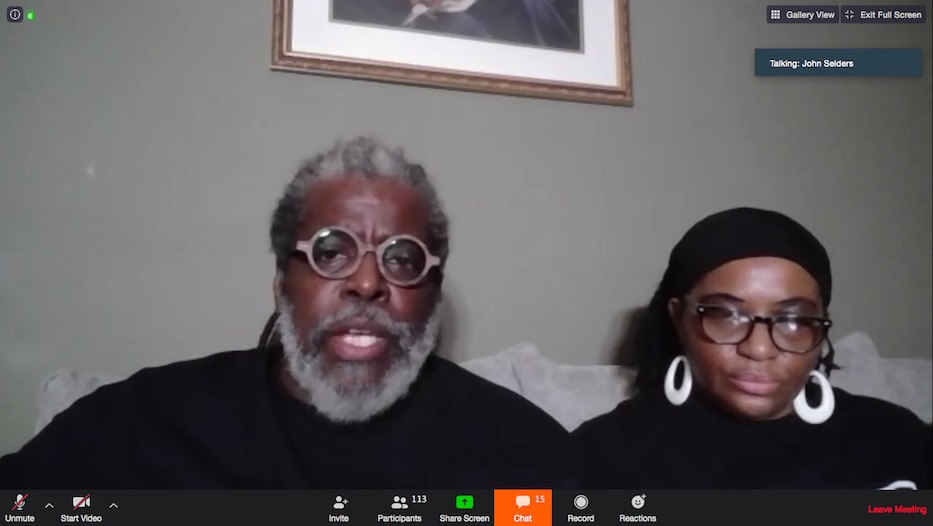
Culture & Community | Faith & Spirituality | Hamden | Arts & Culture | Black Lives Matter | COVID-19
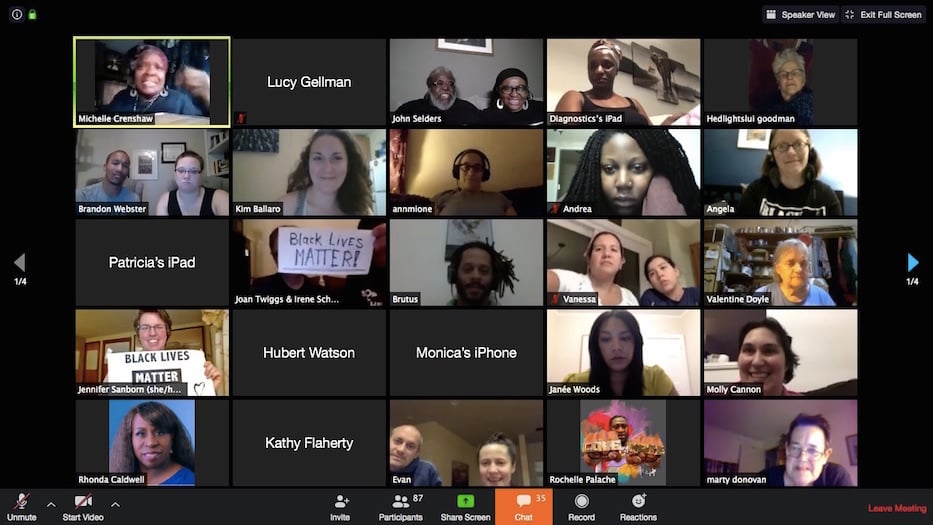
| Zoom. |
The names rang out one after the other, punctuating a heavy grief. João Pedro Mattos. George Floyd. Sandra Bland. Breonna Taylor. Atatiana Jefferson. As if on cue, 126 microphones muted and unmuted themselves. A cacophony rang out from a screen of one-inch boxes.
Close to 200 gathered Wednesday night for a virtual Black Lives Matter rally organized by Moral Monday CT in response to the murder of George Floyd by Minneapolis Police Officer Derek Chauvin. It was the first of two to take place in the state: a second was held via Zoom on Thursday evening, through the group Hamden Action Now.
Organized by Bishop John Selders and Lady Pamela Selders, Moral Monday CT is a grassroots movement inspired by the Rev. William Barber’s long-running Moral Mondays in North Carolina. In the face of COVID-19, the Hartford-based organization has pivoted from on-the-ground protests, rallies and classes to work online, including a virtual rally for 27-year-old Jose Soto after he was killed by law enforcement in Manchester last month.
“There's lots and lots of work for us to do,” said Lady Pamela Selders during the rally. “I believe that's why we're here. That's why our souls decided to be here at this COVID moment. This COVID time. This racism is killing all of us. It's killing all of us.”
Some attendees came with Black Lives Matter posters and signs that sat beside their computers and in their laps. Others curled on their couches or sat at their dinner tables with their partners and kids, soaked in the white light of a screen.
Over almost 90 minutes, activists, organizers, faith leaders, and attendees focused on both the need to mourn and of Floyd’s death as part of a long history of redlining, disinvestment, structural racism, willful segregation and violence engineered by white supremacy.
Calls for Black lives centered on the state-sanctioned murders of Black people in both the U.S. and worldwide, from Atatiana Jefferson, killed while playing video games in her home, to João Pedro Mattos, killed this month by law enforcement in Brazil.
At the Selders’ request, all attendees unmuted their microphones and repeated the name of one life lost to police brutality and white violence after each speaker. Before they did, speakers powered up their computers from Hartford, New Haven, Boston, Oakland, and as far as the Philippines and Brazil.
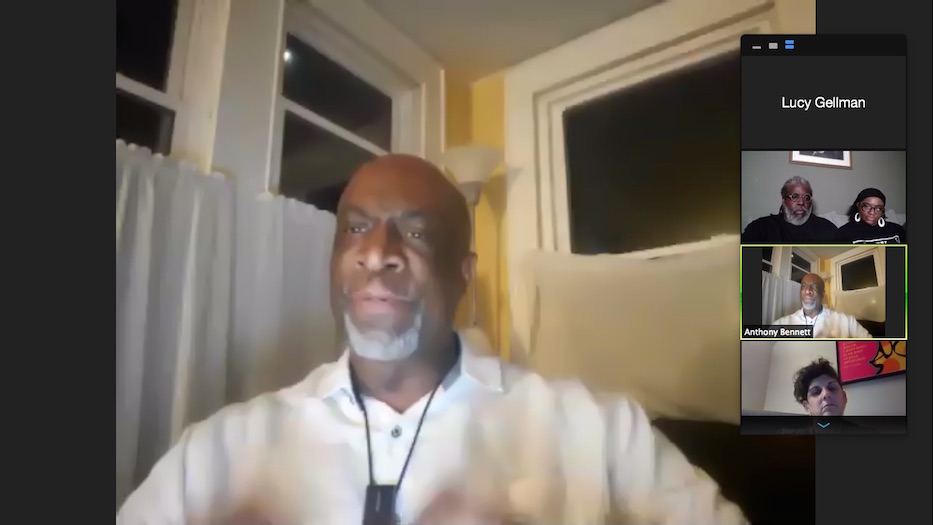
Dr. Anthony Bennett, lead pastor at Mount Aery Baptist Church in Bridgeport, urged attendees not to lose hope. He recalled listening to the words of Rev. Osagyefo Sekou as he was driving recently. From the car’s speakers, Sekou belted the words “we ain’t gonna stop until our people are free,” the hook on his song “Neighbor."
Sekou wrote the song, which appears on his 2016 album The Revolution Has Come, in response to the murder of Michael Brown and ensuing protests in Ferguson, Missouri, in August 2015.
Five years later, the words still hit Bennett hard. He lives that mantra—and the weight of that grief—as a parent, grandparent, and spiritual leader. For the past two months, he has been performing two burials per week, a number that has risen as COVID-19 claims more Black lives at a higher rate than their white counterparts. The signs of trauma on Black bodies are all around him. As he listened to Sekou’s words, tears began to roll down his face.
“It was in that moment that I got my peace,” he said. “So I'm ready to fight. It freed me. As parents, as activists, as these people, we try to control what we can't control. We have an assignment from the ancestors. And the assignment from the ancestors is to still stand and fight. We can not stop until our people are free."
He summoned Breonna Taylor, a Black EMT who was shot and killed by police in her Louisville home in March. As he uttered her name—"Breonna. We don't want to forget Breonna”—attendees unmuted their mics and began to speak Taylor’s name together, voices rising in a sort of cacophonous prayer.

In the next hour, speakers brought that same fire and grief to their remarks, calling for collective action, space to mourn, and an end to white supremacy by any means necessary. From Boston, Black Lives Matter Organizer Daunasia Yancey focused on the need to both heal collectively and dismantle existing power structures.
“We're reaching for each other. And we’re reaching for answers. And we're reaching for something different to happen this time,” she said. “I'm angry. I'm really angry. That we're in this place again.”
Before calling out Sandra Bland’s name, she turned to white participants on the call and urged them to educate both themselves and their white peers on structural racism. Part of that, she suggested, is learning how to go from bystander to ally to accomplice. Another is breaking through the myth that violence is never an acceptable answer.
“I encourage especially white folks to move y'allselves to the violent part,” she said. “The public spectacle of black death is part of it. We need to not be desensitized to it. We don't see white people dead on the street in the news. Ever.”
Attendees unmuted their speakers to remember Bland, who died in jail three days after her arrest at a traffic stop in Texas.
A child’s voice drifted through the noise, asking “what did she get killed by?” Before attendees could hear a parent’s answer, over 100 mics went back on mute.
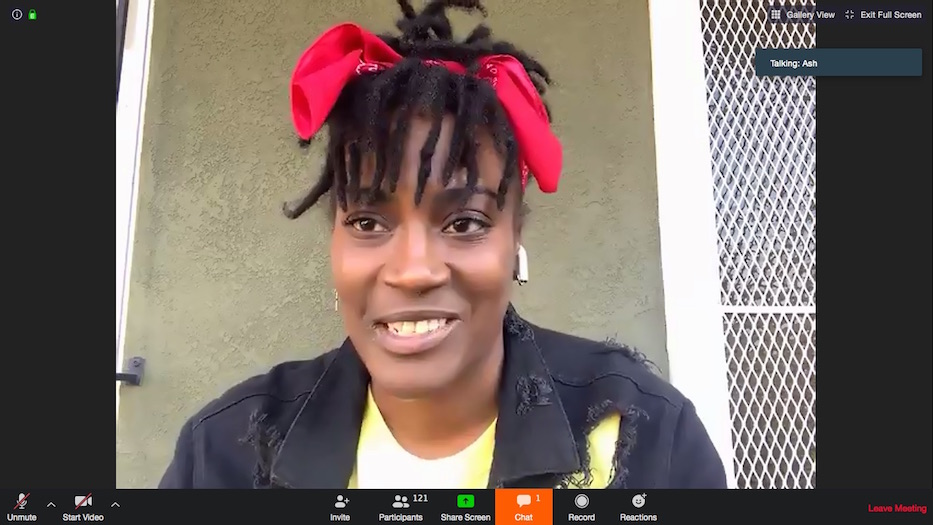
Organizer Ashley Yates, who is now based in Oakland, echoed Yancey as she spoke. Born and raised in St. Louis, Yates was an activist in Ferguson following the 2015 murder of unarmed Black teen Michael Brown. She acknowledged the exhaustion and sadness that hung heavy in the space, but begged attendees to keep fighting.
She drew on the words of Assata Shakur: “Only the strong go crazy. The weak just go along.”
“What we are fighting is so enormous,” she said. "Dig deep within yourself and find what you can do. Don't limit yourself to what they've taught us."
In the comments bar, attendees added their own impromptu testimonials, just as they may have at a gathering in person. State Rep. Robyn Porter, who represents New Haven and Hamden, thanked participants for their words as they spoke. C.J., a Black Lives Matter activist based in New Haven, wrote that she is constantly angry at America as the mother of a Black son, whose life is threatened simply because of who he is.
“This is wrong, this is shameful that in the most powerful country in the world Black and Brown people have to literally be grateful to wake up another day,” she wrote. “Shame on you AmeriKKKa. Legally allowed white supremacy. Normalized oppression.”
“Pre-COVID during COVID post COVID they love killing and oppressing us,” she later added.
As both she and her husband were closing out the rally, Lady Pamela Selders thanked attendees for coming on Zoom, noting that it was a poor substitute for in-person gathering. She encouraged those interested in learning more to join her this June, for an online class on understanding white supremacy.
“Thank you all for showing up,” she said. “Thank you for sharing your hearts and your energy. We hate that we had to meet up like this. That there's been another Black man whose life is gone, senselessly.”
She told attendees that she had watched the video of Floyd’s murder, horrified. She saw the cops tackle Floyd. She watched Chauvin place his knee on Floyd’s neck. She listened as Floyd yelled out for his mother. She knew how the video would end.
“And it broke me.” she said. “Because as a mama, there's nothing I wouldn't do to save my child. Nothing. And I realized he was calling to Black mothers. And to all mothers. And to mother earth … The divine feminine must come forth. We have to answer that call. And I'm committed to doing it.”
“I’m So Damn Tired”
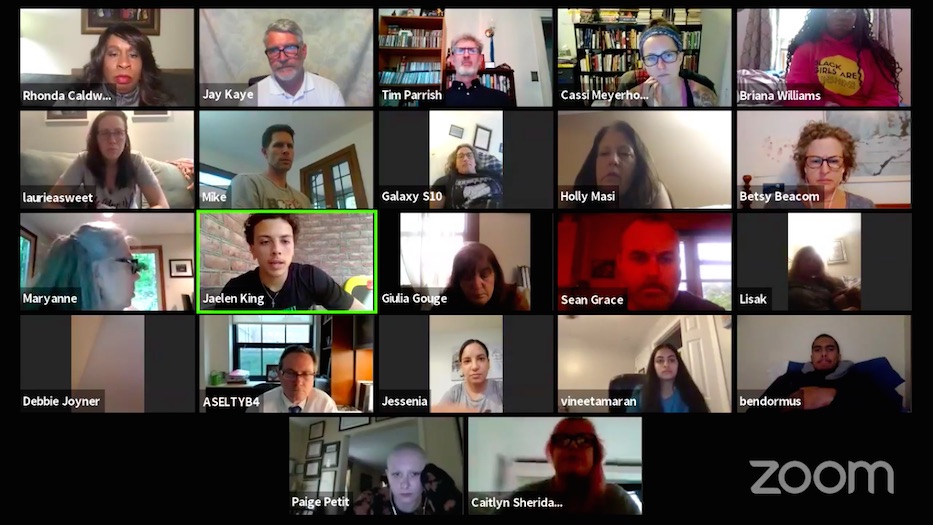
On Thursday night, the group Hamden Action Now kept that momentum going with a second online rally that ran just short of two hours. Using Zoom and Facebook Live, activists bridged the distance, calling for community collaboration even in a time of physical separation.
“When I saw that video of Stephanie and Paul getting shot at, when I say the video of Anthony Vega being shot at, when I saw the video of George Floyd being pinned to the ground and begging and pleading for mercy—that is the most helpless feeling any human being can get,” said organizer Rhonda Caldwell. “This is a human being. This person, this officer, casually had his hand in his pocket while he was choking the life out of him.”
“This is something that legislation and policy and procedural changes are not going to resolve,” she continued. “White people have to begin to feel a connection to the people being killed at the hands of law enforcement.”
Over an hour and 50 minutes, activists and community members grieved, vented, commented on their frustration, and looked toward future action. Debbie Joyner urged attendees to remember “we are all human beings,” a fact that has been laid in stark relief by the COVID-19 pandemic. Several spoke to feeling disempowered, gutted, and exhausted. Others pushed for policy and organizing.
Robin Ellington called for a state-by-state boycott that could begin with Connecticut. Jaelen King, a member of Black Students for Disarmament at Yale, suggested that the answer is in community building. State Rep. George Logan, who represents Hamden, expressed his frustration at the brutality of the police. Artist, activist and writer Briana Williams noted that “racism is just wrong,” and has led to a state of moral depravity across the country.
“Before that person was a cop, they were a person,” she said. “They were a child. And they had a family that instilled morals and things in them that are not the same as ours. They don’t see Black people as people. As humans. And that shit runs in their blood.”
Others pledged to take part in action items that are possible with social distancing. Mariam Khan, who leads the group Connecticut Period, reminded attendees that fighting white supremacy also means fighting the carceral state and learned anti-Blackness across white and non-white communities. Jay Kaye, who ran as a Republican against Mayor Curt Leng in Hamden’s last mayoral race, vowed to talk to five fellow white people “that I know don’t get it” and talk to them about white supremacy.
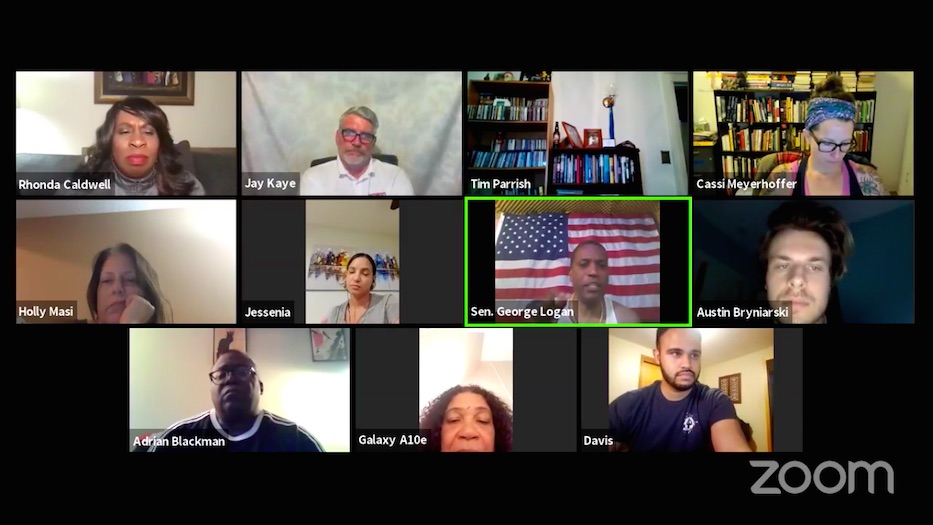
That call—for the emotional work of undoing racism to fall on white people—echoed from one one-inch box to another. Cassi Meyerhoffer, an assistant professor of sociology at Southern Connecticut State University, urged her white peers to educate their friends and colleagues. She outlined the growth of the police state as a direct result of racism and distrust of Black bodies.
“If you want to be a white person who is anti-racist, you have to commit to a lifetime of discomfort,” she said. “It’s not going to be comfortable, and you’re going to lose people … but I think the other side of that is embracing your humanity.”
Justin Farmer, calling from a meeting of Hamden’s Legislative Council, honed in on the way structural racism plays out in town budgeting. As the town’s Board of Education faces a $2.8 million cut in funding, he pointed to new funding to the Hamden Police Department for a $60,000 police diversion program directed at students.
“It’s picking up students in schools for simple violations and giving them a choice between joining this program and getting charges,” he said. “Structural, institutional racism is something that needs to be addressed. And for those of us on the front lines, I’m so damn tired.”
He lambasted the town government for pushing back on student-led initiatives to make Eid a holiday and cutting funds from the schools. In a meeting Tuesday night, members of the Board of Education listened as Superintendent Jody Goeler suggested cuts would come at the expense of equity initiatives.
“We have to have the conversations with our family and friends,” he said. “Don’t call me about, ‘aw, man, it must be hard for you.’ It’s not about me. It’s about our community. Getting involved, whether it’s activism, whether it’s politics … it has to be a global conversation.”
“Take Good Care Of Your Heart And Your Spirit”
Others also focused on the rally as a healing space. Caldwell explained that she woke up Thursday knowing she needed somewhere to talk and to listen. In a single week, she watched as Amy Cooper weaponized her whiteness and Floyd had the life choked out of him.
It fell in a series of months where she has watched COVID-19 disproportionately affect people in the Black community. When she texted friends and fellow activists, some said they worried it was too early. She decided to go forward anyway.
“By logging into this call, you already made a decision that you were going to be on the right side of justice,” she said.
Babz Rawls-Ivy, editor of the Inner-City News and a host on WNHH Community Radio, called on attendees to acknowledge the history and trauma of white supremacy, but also to protect themselves. She said that she worries constantly for her children, two boys and two girls, and for herself. Fighting is necessary, she said—but so is rest as an act of resistance.
“I would invite you all to take care of your spirit and your heart,” she said. “Let not your heart be troubled to the point where you cannot breathe and you cannot think. Tonight before you go to bed, put your hand on your heart, feel your breath in and out. Because we just witnessed somebody losing theirs. So hold onto yours.”
“Find some way to take care of your heart and your spirit,” she said.
Moral Monday CT is on Facebook, Twitter, and Instagram. The group will be offering a weekly course in “Understanding White Supremacy” starting in June. Find out more at their website. Watch Hamden Action Now’s full rally here.

